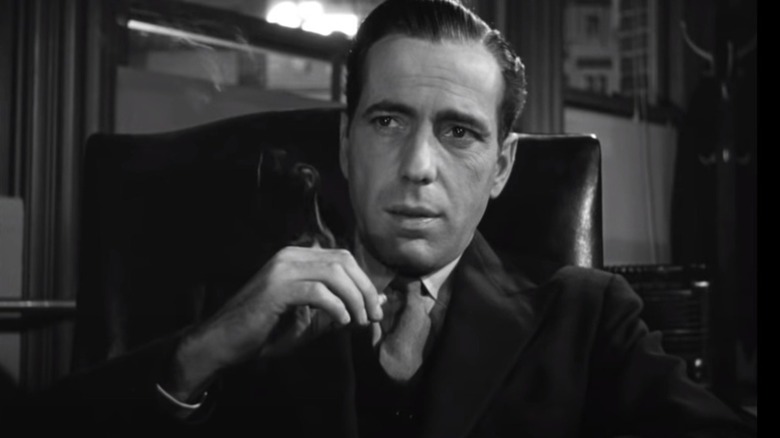
Detective movies and film noir became synonymous in the 1940s with films like "The Maltese Falcon" and "The Big Sleep." Both classics feature a rogue private eye played by Humphrey Bogart, framed in dramatic shadows, as he plays a daring game of wits with femme fatales and scheming elites.
Of course, not all great noirs are detectives stories. "No Country For Old Men" isn't. "Drive" isn't. Noir visual style has become so standard in Hollywood moviemaking that basically every modern film deploys the genre's layered lighting scheme to create the illusion of depth. That's why all the greatest detective films are also, visually at least, noirs.
Enigmatic stylishness aside, detective tales tug at something buried deep inside us. We crave both mystery and resolution. Whether it's a big city copper on the case like in "L.A. Confidential" or a citizen-detective like in "Memento," a puzzle plot methodically decoded by one determined investigator is a deeply satisfying brain game. And there's hardly a better catharsis than a cleverly linked succession of clues leading to one big reveal — as evidenced by how jilted we feel by a weak or inexplicable ending. Here are the 20 best big-screen detective stories that deliver high cinematic style and a satisfying plot payoff.
Brick
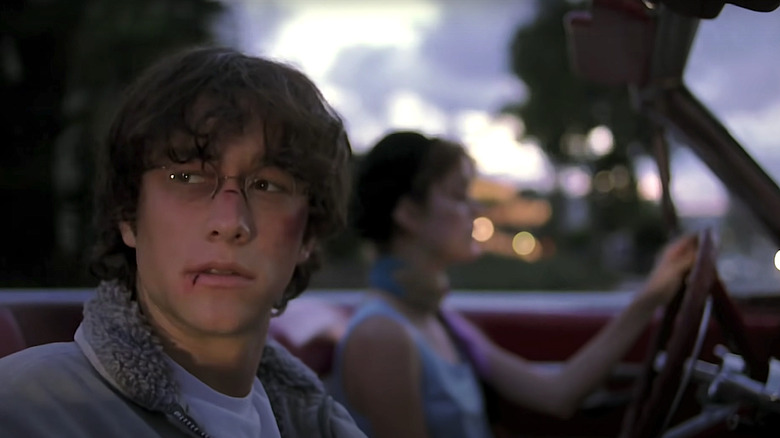
Rian Johnson's 2005 feature debut, "Brick," is a meta-noir in the tongue-in-cheek style of "The Third Man" that envelopes a bunch of high school kids who all seem to know how to play their archetypal parts. The director has these teens emulating Humphrey Bogart, talking in laconic, pithy bursts which never give away too much of the plot. The stylized conceit feels odd coming from the mouth of babes and is an amusing way to highlight the tropes that have long been the basis of the detective genre.
Joseph Gordon-Levitt plays Brendan Frye, an upperclassman trying to figure out who killed his girlfriend (Emilie de Ravin). He's a loving parody of noir anti-hero detectives, but with little of the signature bad boy swagger. He's got the wise-cracking patter down as he spars with one reluctant witness after another. But he's simultaneously an awkward, fluffy-headed teen with a shy habit of stuffing his hands deep into his pockets. If you don't get Johnson's joke about the earth-shattering self-seriousness of teenage life, this admittedly low-budget flick is going to seem clunky and oddly old-fashioned.
The French Connection
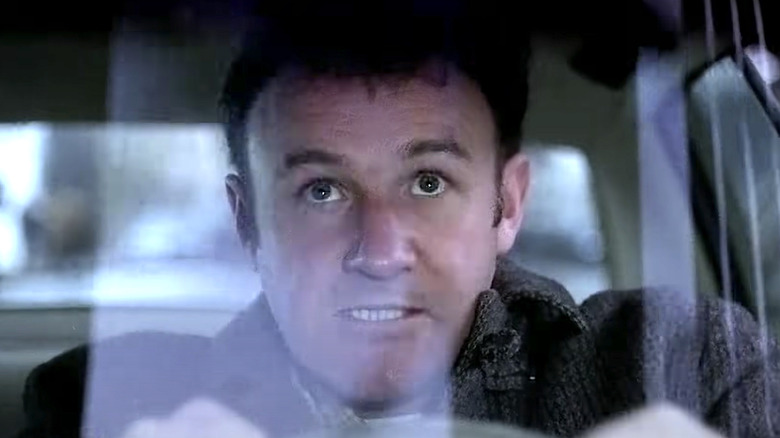
In the famous car chase from "The French Connection," a police detective played by Gene Hackman screams down busy New York streets. As he chases a train above, he blasts through red lights at speeds over 90 mph. Disturbingly, almost none of this was staged. Director William Friedkin ("The Exorcist") never closed down the streets for the stunt. The 15-minute scene was shot with no permits aside from a $40,000 bribe paid to a transit official. Friedkin simply goaded a stuntman to go for it and shot the whole thing over his shoulder. The incident has become famous in recent years as one of the most reckless acts of guerrilla filmmaking in Hollywood history.
The Oscar-winning film's often jittery handheld camerawork also gives it an intentionally gritty documentary feel. Gene Hackman and Roy Scheider (of "Jaws" fame) play a good-cop bad-cop detective team methodically tracking a heroin syndicate all the way to its source in France.
Friedkin explains on the film's commentary track he was interested in "the thin line between policeman and criminal." But it was the filmmaker himself who was crossing some lines. His movie was a smash and has endured as a classic, but he also rued his recklessness in 2021 as the film celebrated its 50th anniversary. "I was like Captain Ahab pursuing the whale," Friedkin told the New York Post. "As successful as the film was, I wouldn't do that now. I had put people's lives in danger."
The Girl With The Dragon Tattoo
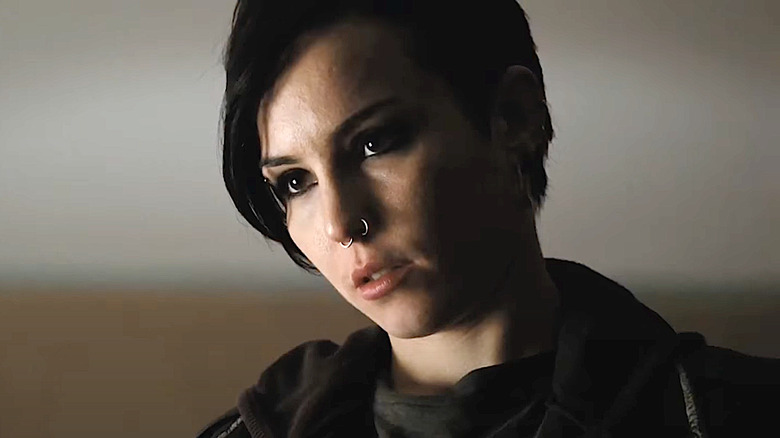
David Fincher's stylish 2011 remake of "The Girl With The Dragon Tattoo" starring Rooney Mara and Daniel Craig certainly has all the director's signature polish: the emotionally intuitive camera movements, the beautifully coordinated noir colors, and of course, the artistic framing with all the right symmetry and leading lines that scream high-end Hollywood cinema. And yet, Hollywood's foremost formal stylist seems somewhat uninspired in this redundant effort to cash in on an overseas hit.
Based on the mega-bestselling mysteries by Swedish journalist-turned-novelist Stieg Larsson, the original 2009 film adaptation starring Naomi Rapace is the more engrossing film. It follows the travails of orphaned hacker Lisbeth Salander who teams up with a disgraced reporter. This odd couple finds redemption as they investigate the cold case disappearance of an heiress with dark and incestuous secrets.
There's nothing wrong with the American remake, but there's just something so characteristically Swedish about the source material that the farther afield it goes, the less it resonates.
The Big Sleep
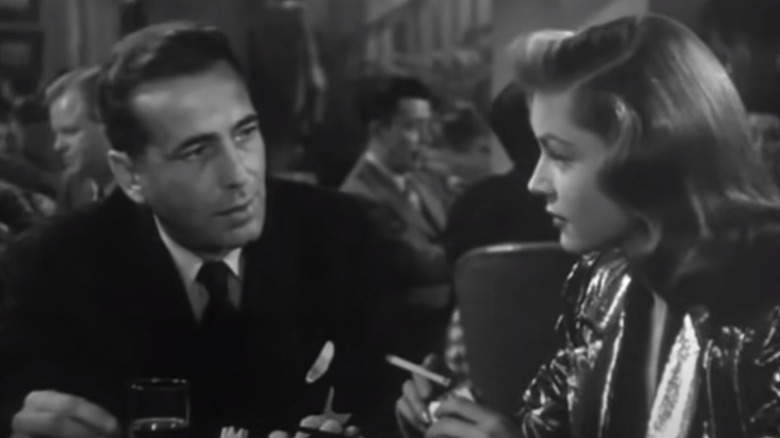
Fans are still active online, puzzling over the intricate and confusing plot points of "The Big Sleep." It's a testament to the staying power of director Howard Hawks' 1946 adaptation of hard-boiled detective writer Raymond Chandler's novel. Hawks himself was famously so confused by the plot during filming that he called up the author for help, but Chandler was stumped too.
Humphrey Bogart plays private eye Phillip Marlowe who is hired to help a young woman deal with a gambling debt. Nothing is ever what it seems in noir, though, and soon he's pulled into a thicket of underworld deviance from blackmail schemes to murder. Bogart's excellent co-star is, of course, Lauren Bacall whom he would wed just months after filming concluded.
Bogey's fast-talking style is iconic but also part of what makes him a difficult guide through the rapid revelations of names and places as the mystery escalates. "The Big Sleep" is a genuine intellectual challenge where the detective work really falls on the audience.
Insomnia
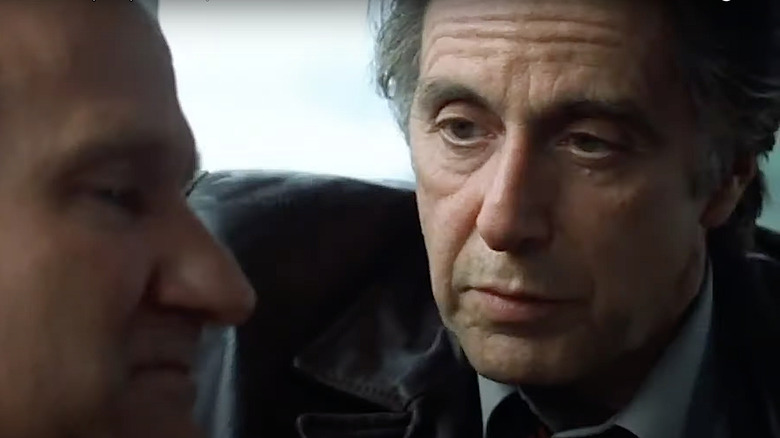
Director Christopher Nolan has no one to blame but himself that his excellent 2002 psychological thriller "Insomnia" is somewhat overlooked. He's just made too many memorably inventive films for this traditional detective story to make an impression.
Al Pacino plays Will Dormer, a veteran police detective with a checkered past, who gets called to a remote Alaskan town to assist the local authorities in investigating the murder of a teenage girl. When a creepy novelist played by Robin Williams becomes the prime suspect, the cop and the writer battle for control of the narrative.
Nolan's prior film, "Memento," is in many ways a cynical story that ends with the revelation that everything you saw is a cycle of violence and degradation that will continue. In "Insomnia," the director embraces conventional Hollywood storytelling ethics in which a protagonist's tragic sacrifice represents some return to the moral order. Maybe this shift is because neither Nolan nor his brother was responsible for the source material. Still, "Insomnia" has the optimistic tone Nolan would return to for a more famous detective in "The Dark Knight." Regardless, it's gratifying to watch the foremost auteur of the aughts and cinematographer Wally Pfister churn out this entertaining potboiler, crafted with the duo's exacting standard of visual perfection.
Shutter Island
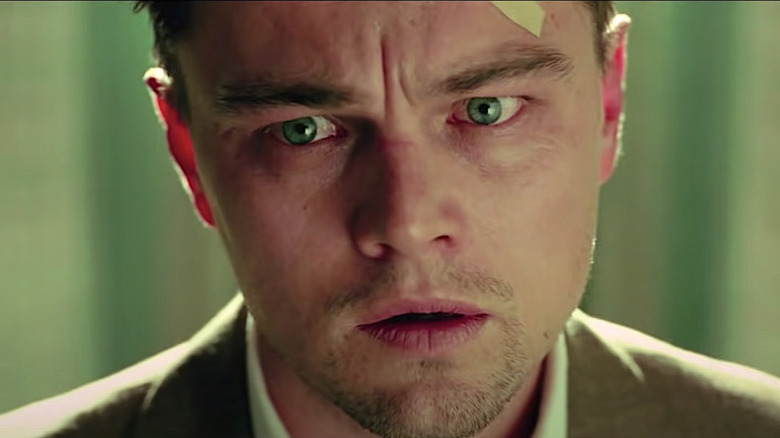
In 1976, "Taxi Driver" proved that then 29-year-old Martin Scorsese was a prodigy. The film's bloody crescendo belied a deep social critique buried in the egotistical nihilism of its protagonist, Travis Bickle (Robert DeNiro). It all felt revolutionary and in keeping with New Hollywood's iconoclasm as a wave of films broke with old studio standards. When Scorsese made arguably the most technically brilliant film of his career with 1990's "Goodfellas," his place in the pantheon of iconic auteurs was assured.
Nevertheless, Scorsese faces undue scrutiny every time he indulges in a genre film. Top critics were dubious about "Cape Fear" in 1992 and similarly dismissed his other masterful thriller, "Shutter Island," in 2010 because it's not full of groundbreaking artistic insight. It's just a creepy and perfectly wrought detective story that grips you with its twisty excellence.
Leonardo DiCaprio plays a federal marshal sent to a remote island insane asylum to investigate the disappearance of a patient. Strange things are afoot, including the distinct stink of Nazi experiments. But it's also clear nothing is what it seems. The mental hospital gaslight genre is actually a pretty crowded ward, but "Shutter Island" is by far the best of these films. That's largely thanks to Scorsese's clear love of the noir detective story tempo as he cleverly reveals this mysterious island's tragic secrets.
Chinatown
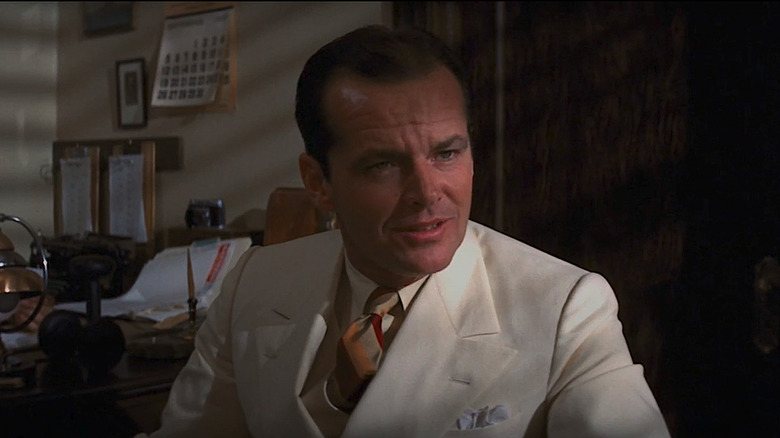
Roman Polanski's "Chinatown" may be somewhat overrated by the old guard since it emerged from Hollywood's vaunted sudden turn towards experimentation in the 1970s. But this twisty tale of Los Angeles corruption remains worthy of praise, particularly for Jack Nicholson's excellent lead performance. Nicholson never officially retired, but he hasn't appeared onscreen since 2010. "Chinatown," however, is among the best artifacts of his youthful greatness
Nicholson plays Jake Gittes, a Los Angeles private eye. In a classic noir call to action, a suspicious woman (Faye Dunaway) bursts into his office and wants to hire him to look into her husband. When it turns out she's an imposter, Gittes uncovers the lurid corruption that made it possible to build a city atop a parched California desert in the first place.
If you do get down on "Chinatown," take note that "The Maltese Falcon" director John Huston plays the film's ruthless villain. He's a powerful menace and central to the film's sickening final twist as Polanski faithfully recreates the genre style that Huston basically invented. For fans of noir, this fact alone makes "Chinatown" essential viewing
Memento
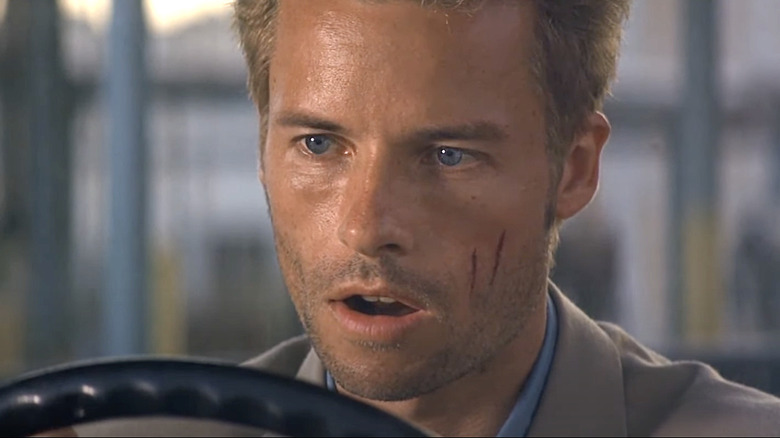
One of the keys to enjoying "Memento" is to avoid watching it with that irritating subset of cinema-hating trolls whom Alfred Hitchock famously dubbed "the plausibles." This consortium of plot cops isn't interested in the language of film. Interested only in poking holes, they watch movies as superficially as possible. It's particularly aggravating to sit through a sci-fi or fantasy film with one of these critics. There could be winged pigs orbiting Mars at the speed of light, and they'd pipe up with some quibble about how all these swine found such form-fitting space suits.
My point is incoming. Wait for it. In Christopher Nolan's "Memento," Guy Pearce plays a man who loses his ability to make short-term memories after witnessing the brutal murder of his wife. Despite the disability, he's hellbent on tracking down her killer, but his only clues are scribbled on the backs of polaroids or carved into his flesh.
Enter "the plausibles": "How does he remember that he has no memory?" or "How does he remember his wife is dead?" they gleefully retort, desperately sure they've thought of something Nolan hasn't. In this situation, you can either call your primary care provider and ask for a referral to a neurologist for a scientific explanation — or you could just enjoy one of the most inventive and engrossing modern noirs ever made.
Rear Window
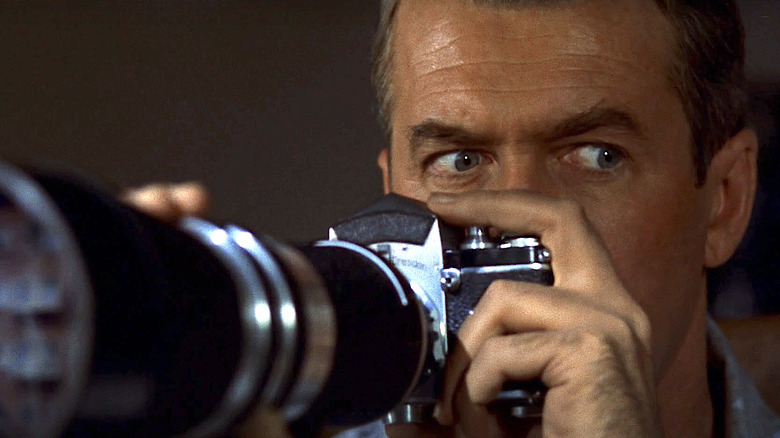
New York summers must have been brutal before air conditioning was widely available. Even today, in the city's cramped courtyard apartments, summer means months of open windows and lots of detached intimacy between otherwise anonymous neighbors.
That's the premise of Alfred Hitchcock's 1954 film "Rear Window." Jimmy Stewart plays L.B. Jeffries ("Jeff" for short), a renowned photographer recuperating after breaking his leg on assignment. His boredom in convalescence leads to long hours of spying on his neighbors whose lives unfold outside his window. When he thinks he's witnessed a murder, his doting fiancée, played by Grace Kelly, believes him, but this peeping Tom detective needs more proof to persuade the police — and to catch the killer whose sights may now be set on him.
"Rear Window" is a remarkably provocative film for the era. Jeff makes up nicknames for all his neighbors, including a stunning young dancer often seen in states of undress whom he calls "Miss Torso." Kelly even parades before her laid-up cameraman in an elaborate nightgown she flirtatiously describes as "a preview of coming attractions." Public film screenings are often called "exhibitions," and the viewing experience is certainly an unmistakably voyeuristic act. Hitchcock, ever the playful cad with an unmistakably ironic wit, artfully constructed this remarkable thriller as a clever ode to the inherent vice of his own devious craft.
Zodiac
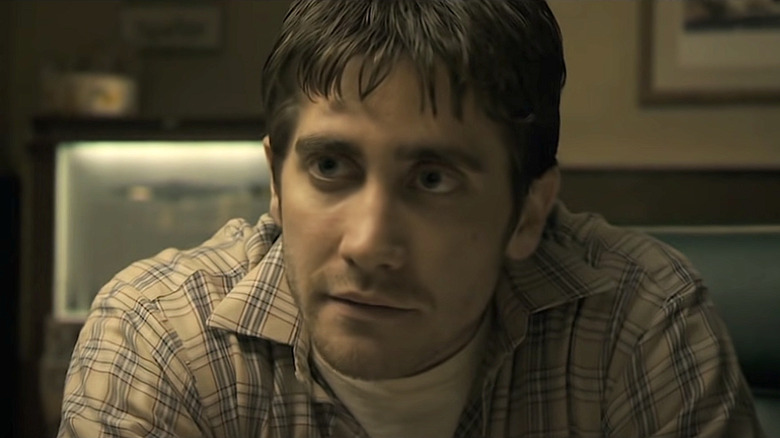
In 2021, true-crime obsessives seemed to have cause to celebrate when a team of cold case detectives claimed to have finally identified the Zodiac Killer, a mysterious serial murderer who haunted San Francisco in the late 1960s and early 70s. For decades, cryptologists have puzzled over the ciphers this monster first sent to Bay Area newspapers in 1969. There have been many suspects, but the codebreakers claimed to have finally unscrambled the missives, identifying Zodiac as Gary Francis Poste, a supposed rural gang leader who died in 2018.
David Fincher's masterful and suspenseful "Zodiac" from 2007 didn't have this seemingly plausible answer to incorporate. And that's a good thing. The film isn't about answers but rather an obsession with a mystery that produced nothing but dead ends for decades.
Jake Gyllenhaal plays Robert Graysmith, a cartoonist at the San Francisco Chronicle which was one of the newspapers that really did receive these taunting ciphers. Graysmith's handiness as a cryptologist leads to a life-destroying (but weirdly understandable) fixation. Like all of Fincher's work, "Zodiac" is technically brilliant, but it's also a remarkably restrained mood piece about the psychological toll of this long-unsolved mystery.
Knives Out
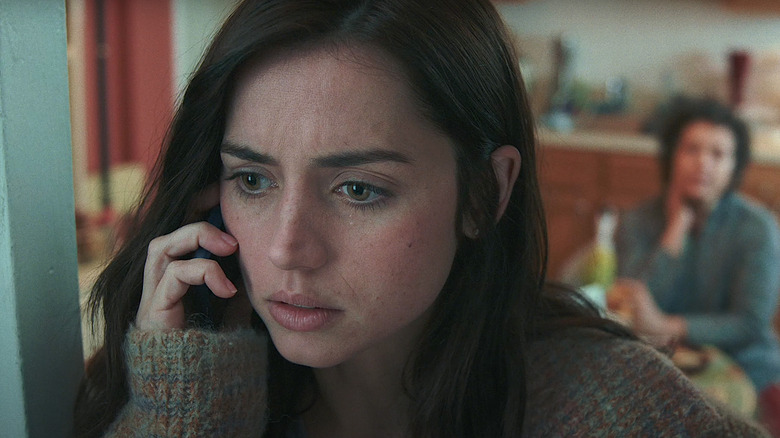
"Knives Out" has a handy clue generator that must be every detective's dream: a key witness (played by Ana de Armas) who gets physically sick to her stomach when she lies.
This "Clue" style detective comedy is about the strange death of a wealthy mystery novelist (Christopher Plumber). He's the patriarch of a scheming family of ingrates living off his largesse. Everyone is a suspect. Daniel Craig ditches his native British accent for an exaggeratedly slow southern drawl as his character, Blanc, methodically works through the riddle.
"Knives Out" is the creation of writer-director Rian Johnson, the auteur responsible for the controversial "Star Wars: The Last Jedi." Johnson deserves credit for hilariously triggering that franchise's fanboys, who have demanded Disney turn the once spiritual endeavor into a soulless, repetitive, information-culture Easter egg hunt for nostalgic callbacks. He's also the genius behind the low-budget sci-fi masterpiece "Looper." In other words, he's a rebel and a storyboard craftsman. In "Knives Out," he uses his suspicion of establishment consensus and his knack for tightly-wound plots to construct a clever critique of bourgeoise hypocrisy. De Armas is delightful as the film's working-class conscience, and her chronic nausea is perfectly understandable given the company she keeps.
The Third Man
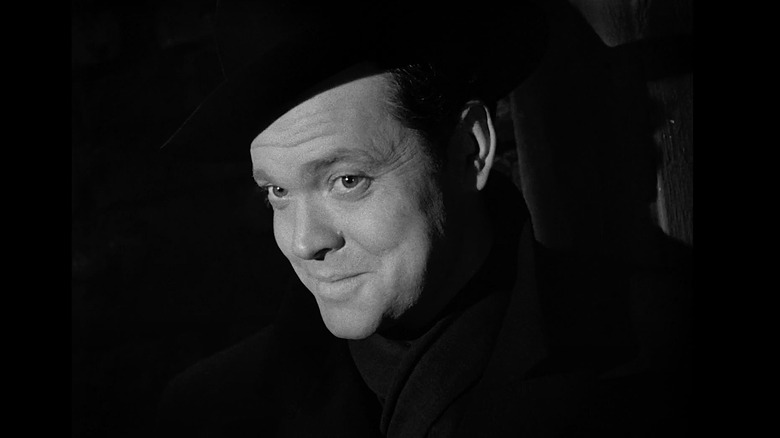
"The Third Man" from 1949 is often considered the best British film ever made. Joseph Cotten plays Holly Martins, a pulpy western writer who arrives in Vienna to stay with his friend, Harry Lime(Orson Welles). When Martins discovers that Lime has died in a suspicious accident, he must become a citizen-detective to get to the bottom of a complex mystery.
The film has all the noir tropes. The excellent ensemble cast immediately feels allied against Martins and his effort to find answers. He even falls for the grieving girlfriend of his dead best friend. Forbidden love is often key to the genre and pushes its heroes into a choice between their desires and their conscience. This is also a story about post-war Europe. The wartime corruption portrayed in films like "Casablanca" continues here, as a shadowy black market has taken root in the ruins of a once-great city.
Aside from "Citizen Kane," "The Third Man" is Orson Welles' best role. The difficult auteur-actor certainly lived up to his diva reputation on set. He showed up two weeks late and then flat out refused to shoot a crucial scene. This forced overworked director Carol Reed to later recreate a complex set and shoot around a body double. Reed's grueling production schedule led to an amphetamine addiction as the director struggled to finish his masterpiece on budget.
Prisoners
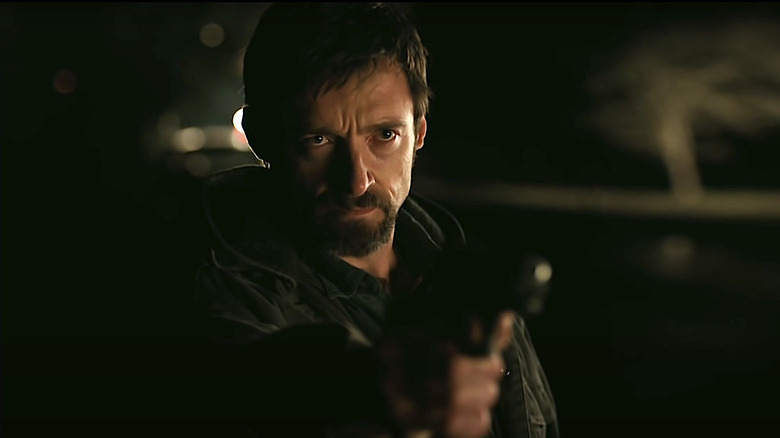
"Prisoners" is an incredibly tense and dark thriller from director Denis Villeneuve ("Arrival," "Blade Runner 2049," "Dune"). Since this 2013 stunner, Villeneuve has become Hollywood's premier big-budget filmmaker. Alongside his recurring collaborator, master cinematographer Roger Deakins, the director unfurls this morbid tale of a missing little girl and an enraged father (Hugh Jackman) who will stop at nothing to find her.
Jake Gyllenhaal is stellar as the somewhat flatfooted lead detective on the case. He's a good cop but very distracted by Jackman's suspicious antics as this deeply distraught dad starts down a dark path of vigilante justice.
"Prisoners" is partly about a citizen-detective, but Jackman's character is a very blue-collar guy. He's not coding facial recognition algorithms and hacking into street cameras. He has no unique set of skills. The film is partly so intense because, despite the graphic-novel level melodrama, Villeneuve anchors the action with plausible details. When Jackman finally gets his hands on a suspect, all he can think to do is use his carpentry skills to brutally extract some answers. This is a moral error for which he must pay. "Prisoners" is Villeneuve's first big Hollywood feature, and it's a total knockout that announced the reign of a staggering talent who has since proven this masterful noir was no fluke.
The Maltese Falcon
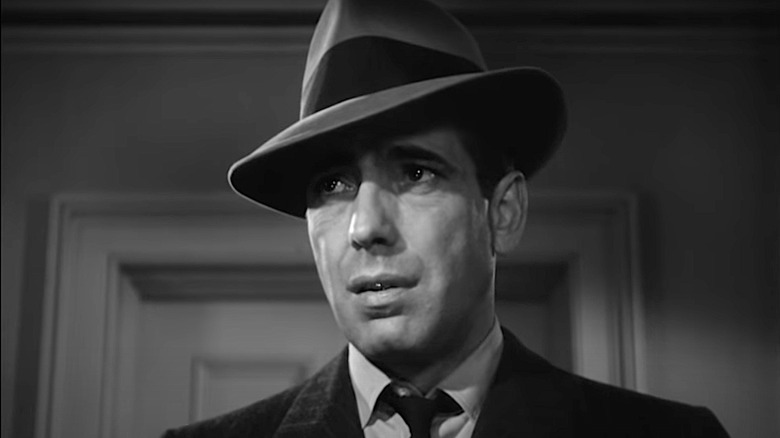
In The Hollywood Reporter's original 1941 review of director John Huston's "The Maltese Falcon," the film's stylized performances are praised as "strikingly natural." To modern eyes, Humphrey Bogart's fast-talking turn as private detective Sam Spade is anything but naturalistic.
"The Maltese Falcon" has gone down in film history because it is so purposely stylized. The film's innovative shadowy cinematography, borrowed from German expressionism, basically created the film noir aesthetic. Shades of this gritty style can be seen in every movie on this list.
The Hollywood Reporter also amusingly digs at Huston contemporary Alfred Hitchcock's heady hang-ups, noting that "The Maltese Falcon" is "blessedly lacking in psychological implications." American critics of this era somewhat underrated Hitchcock, who was being hailed as a genius in France. Hollywood watchers, meanwhile, were of practical mind and rooting for American films to be entertaining and competent. "The Maltese Falcon" is both, but it's also a historically significant time capsule of classic Hollywood values. Much like chivalric cowboys of the Western genre, Spade is the quintessential rugged individual. He's a street-wise rebel, working just outside the law.
Blade Runner 2049
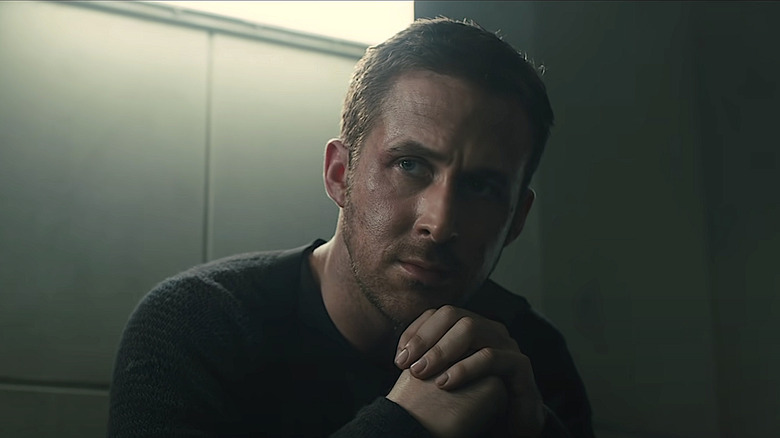
When "Blade Runner 2049" took a dive at the box office in 2017, it felt like a cautionary tale for Hollywood about the perils of making smart, thoughtful, visually stunning films.
Ryan Gosling replaces Harrison Ford as the titular Blade Runner tapped with destroying rogue androids. But unlike Ford's detective Decker, whose humanity was questionable, Gosling's K is definitely one of the machines. When he discovers a fellow android may have somehow given birth, he's tapped with the task of a preemptive genocide against his own race.
Even more than the original, "Blade Runner 2049" is an emotionally deep detective procedural. The more clues K uncovers, the more all roads seem to lead back to his own creation. It's a fantastic conceit that puts the protagonist at the narrative center of all creation with seriously grim implications for the future of the universe. But that's only if the evil android manufacturer, played by a megalomaniacal yet serene Jared Leto, has his way.
Leto is interesting as always as he aloofly portrays a faux-zen big-tech guru who wants his android "children" to populate the galaxy. The original film's dystopian predictions haven't panned out, but the sequel's notion that one tech oligarch's vanity project could become the defining feature of the cosmos seems all too plausible.
L.A. Confidential
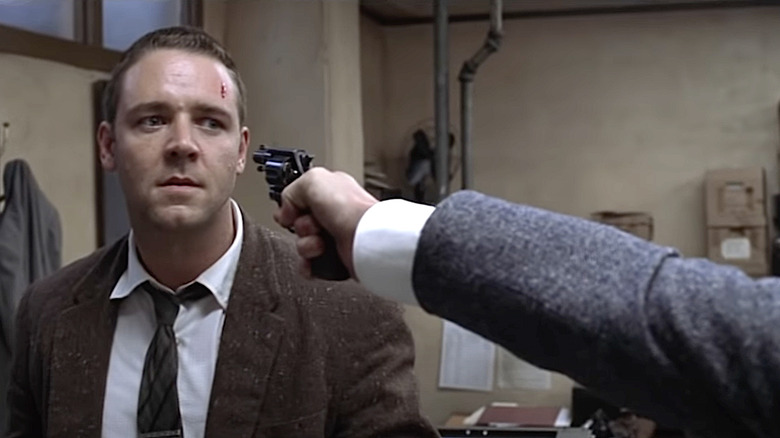
"L.A. Confidential" from 1997 borrows heavily from the themes of Roman Polanski's "Chinatown" and paints a picture of the City of Angles, circa 1953, as corrupt right down to its foundation. The local media is nothing but sensationalist. pay-for-play trash and the police department is bought off, filled with racists, and brutal. As in "Chinatown," the city's elites stand above.
The phenomenal Guy Pearce plays an ambitious cop named Exley. The son of a murdered police officer, he's dead set on making his name and avenging his father. When Exley tries to clean up his own corrupt cop shop, he's pitted against a conflicted old-school hardliner with a hair-trigger temper (Russell Crowe). The tension between Pearce and Crowe is cut with Kevin Spacey as a glib flatfoot who spends his public-funded workdays consulting for Hollywood productions and feeding self-serving gossip to local tabloids.
"L.A. Confidential" has all the elements of classic film noirs but with the technical mastery of modern, big-budget filmmaking. It was produced at that brief '90s peak of perfectly exposed film stock just before a decade of regression as the kinks were worked out with digital cameras. It's the high culmination of half a century of this storytelling style and probably the most entertaining flick in the classic noir style ever made.
Blade Runner
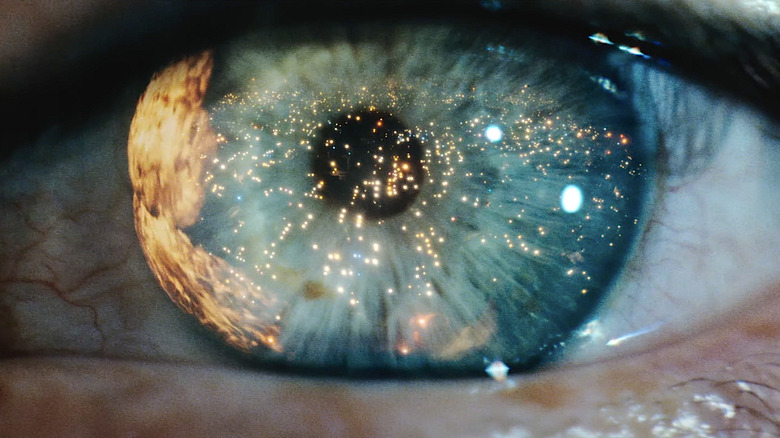
In 1982, Ridley Scott's "Blade Runner" completely reset the look of dystopian futures in Hollywood films. Gone were all the symmetrically gleaming towers of white. Los Angeles becomes a bleak, sunless pit where a race of android slaves have gone rogue to be hunted down by Detective Rick Decker (Harrison Ford). In an excellent nod to the actual history of computer science, Decker distinguishes humans from outlaw androids by administering a rapid-fire digital Turing test.
Despite the fact Decker is tasked with taking on androids with superhuman strength, he works alone. He also lives alone in a futuristic but shadowy hovel where he drinks hard liquor and ruminates. Just as Scott had done three years earlier with the set design for "Alien," he creates a gritty and sopping wet future that is covered in the grime of the past — as it obviously would be.
"Blade Runner" is based in part on the heady 1968 novel "Do Androids Dream of Electric Sheep?" by Philip K. Dick, which was initially set in 1992. The film's setting is moved to 2019, but both dates have obviously come and gone without even a whiff of flying cars or bipedal AI. However, given the rapid advancements in computer learning, the deeper question "Blade Runner" poses about what differentiates artificial minds from real ones, has never been more relevant.
The Fugitive
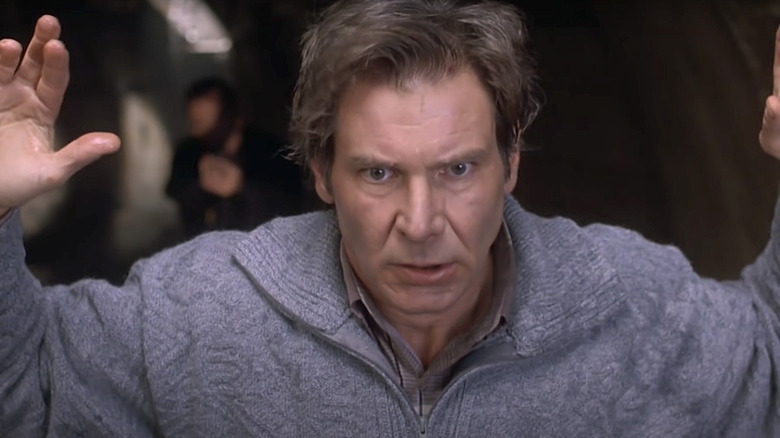
Harrison Ford dons an incredible beard in the opening act of the excellent 1993 remake of the 1960s TV series "The Fugitive." In the film, he stars as renowned doctor Richard Kimble, wrongly convicted of the brutal murder of his wife. When he makes an improbable escape, Kimble gets the chance to clear his name.
Warner Brothers apparently didn't like Ford's facial hair, even though the actor's thick greying whiskers do give him the distinguished look of an esteemed physician. As Ford explains in author Brad Duke's "Harrison Ford: The Films", the studio "paid for the face they wanted to see, so they were very concerned about that."
Of course, once Kimble is on the lamb, shaving becomes a plot-perfect disguise. But it's also symbolic of the good doctor's counterculture status. He's "slightly idiosyncratic, a character a bit outside the medical establishment," Ford explains. "The Fugitive" is a story about a morally upright citizen-detective who has to expose the corrupt medical establishment to find justice for himself and his patients. In 2020, real-world pharmaceutical giants were fined billions for pushing deadly drugs on a vulnerable public. As a partial result of this crime, U.S. life expectancy fell by the most since World War II. "The Fugitive" is mostly a thrilling popcorn movie, but it's also in Hollywood's tradition of skepticism about big pharma and the corrupting influence of all that cash.
The Silence Of The Lambs
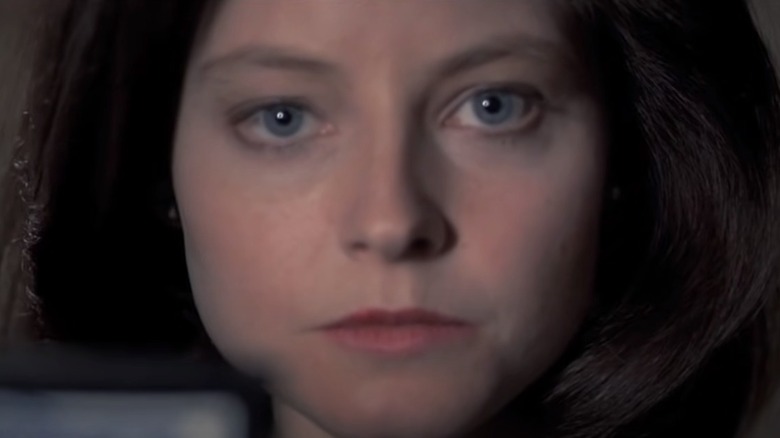
In "The Silence of the Lambs," Jodie Foster's slightness of frame is one of many features that made Clarice Starling the perfect FBI trainee to help track down Buffalo Bill (Ted Levine), a serial killer who skins his victims in a twisted quest for self-transcendence. The opening credits show the five-foot-three Foster training at Quantico as she scrambles through a creepy obstacle course — a metaphor for her coming journey. In a subsequent shot, she's comically dwarfed by her mostly male colleagues in an elevator. When she's tapped to interview the imprisoned cannibal psychiatrist Hannibal Lecter, who may have known Buffalo Bill, it becomes clear she only got the job because her perceived vulnerability will be attractive to the predatory doctor.
Foster's Clarice Starling isn't just a dogged and clever detective. She's also facing a male-dominated law-enforcement establishment that ultimately needs her perspective. It's Starling's understanding of what it's like to be a young woman (along with Lecter's taunting insights) that reveals the crucial final clue.
This added subtext deepens "The Silence of the Lambs" and is no doubt part of why a film that is essentially a gruesome horror thriller somehow nabbed five Academy Awards, including best picture and best actress for Foster's outstanding performance. "The Silence of the Lambs" is on the Mt. Rushmore of modern thrillers and deservedly so. It's every bit as engrossing, eerie, and relevant as it was in 1991.
Se7en
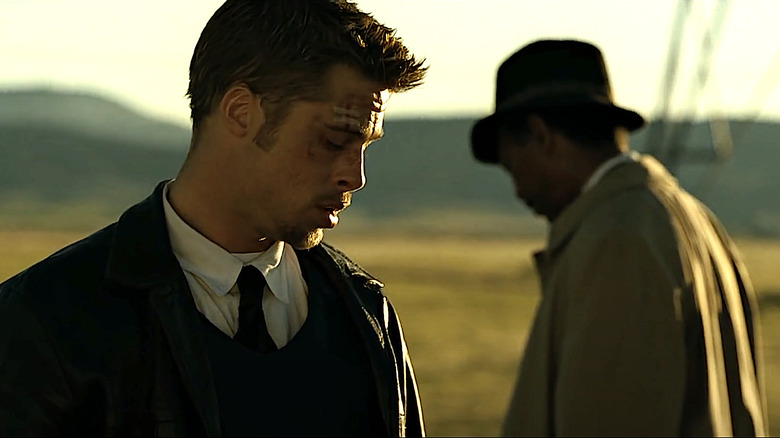
David Fincher's 1995 noir masterpiece "Se7en" is one of those rare timeless films you can confidently share with younger thriller fans. Brad Pitt and Morgan Freeman as police detectives tracking down an Old Testament-inspired serial killer have such a tense and conflict-ridden chemistry that their contentious bromance blooms right to that legendary twist ending.
When "Se7en" came out, the critic at my local newspaper (who shall go unnamed) didn't like the film. He dismissed it as too grim — too visually dark even. I managed to get him on the phone for a school project, and he stood by the review. He just didn't get it.
"Se7en" certainly pushed the noir envelope into gruesome new terrain, its graphic radicalism has helped it stay fresh all these years (and countless "Saw" films) later. However, it's really the script's procedural tautness on top of gorgeous sets and moody modern cinematography that assures it ages so well.
Fincher, who filmed Se7en in sunny southern California, dumps a biblical flood of rainwater on his shots, convincingly transforming the City of Angels into a muck-mired Gothic hellscape. This gritty thriller about urban decay was ironically made at the height of America's booming post-Cold War suburban prosperity. It was a triumphantly hegemonic moment that one intellectual prematurely dubbed "the end of history." Maybe that's why some critics initially found "Se7en" needlessly nihilistic. Multiple bleak decades later, Fincher's best film feels downright prophetic.
Read this next: The 14 Best Noir Movies Ranked
The post The 20 Best Detective Movies Ranked appeared first on /Film.
